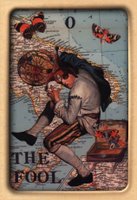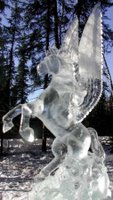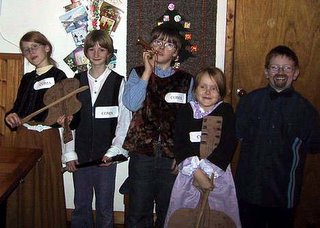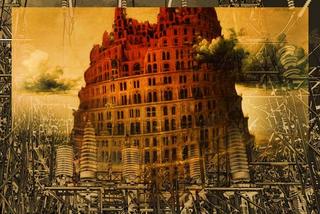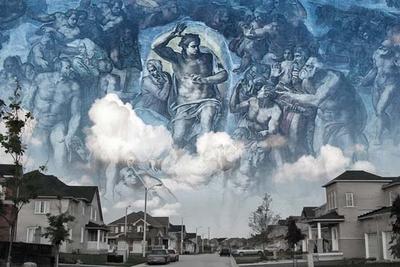MOMENTS IN AMBER - 2005
Grayson Perry suggested in the Times that rather then getting pissed on Hogmanay, we should go over personal lists of the highlights of the previous year. So here's mine - early - so I can drink to my heart's content too.
This was the year where I, first and foremost, learned to be an EFL teacher trainer. I've certainly expended more energy on this than anything else, so I'd have to - reluctantly - say that it's been my greatest achievement. Reluctantly because it doesn't sound very exciting or exceptional. The main thing I do is watch the trainees' lessons, which range from the inspired to the completely inept, but mostly at the lower end of that continuum, and lead discussion on their performances in such a way that trainees (a)learn "experientially" from my prompts and (b) will not break down in tears. Watching bad lessons can be grindingly tedious, but I enjoy managing the interactions of the feedback process, which is a fast-moving problem-solving game when it's good. Emotionally, on the other hand, it is often less the roller-coaster ride of the cliche and more like being in the hands of a first-time driver who stalls and lurches forward at every turn because of his unfamiliarity with the controls. The thing is, I'm largely responsible for that, and if I get things wrong I have to try not to dwell on them in the early hours.
I'll also remember 2005 for free music downloads, thanks to Limewire and the guy behind Bit Torrent. For someone whose main activity in early adolescence (apart from vigorous masturbation, obviously) was taping stuff from the radio, it's a great thrill to have this repeated in mid-life; free music, that is. Having spent years amassing musicalised plastic in various forms and at great cost, I can now act immediately on every recommendation I get - at no cost. Yes, it's a time-waster but I don't care; it's hard to describe the quiet thrill of being able to give an informed opinion on more current bands than at any time since the '95-96 Britpop era. My tastes are still somewhat rooted in the - distant - past, though! It was great that Paul McCartney finally made a good album this year. Contenders for album of the year are Supergrass Road to Rouen, The Engineers self-titled debut, the Boards of Canada and Sigur Ros Takk. But the one that really got me, because of its energy and pretty innovative take on heavy blues was Robert Plant's Mighty Rearranger. My track of the year was the superbly constructed, beautifully sung King of the Mountain by Kate Bush. Loved the ska mid-section.
It's hard to say that having broadband radically decreased the time spent reading this year. I hope this is only temporary! Anyway, the book I enjoyed most was Richard Tarnas's Passion of the Western Mind, which I decided to re-read after a colleague reminded me how good it is. It's a one-volume history of (Western) ideas which is always engaging, even though you already know the plot.
Man of the year was Russell T Davies for braving what could have been a critical panning, and managing to resuscitate Doctor Who, my childhood hero, after 15 years in cryogenic suspension in a time-capsule somewhere. Now with added depth, the new series was a triumph: frightening when it needed to be with clever scripts, it reminded me how good TV drama can be. The best film I saw in the cinema this year was Hotel Rwanda. I'll never forget the eerie "cockroaches" broadcasts from the Hutu radio station, and the moment when the UN had to pull out. It made real what had been a very remote, poorly understood news item while it was happening. (I hadn't lived in Africa then.) I also loved The Quiet American, with Michael Caine.
My most memorable journey of the year was to Krakow during an early, and still near-freezing, Easter holiday. Seeing the beauty of the Medieval market square and eating like kings at the traditional "peasant fare" restaurant were highlights. Auschwitz was what will remain in my memory most - though this isn't the post to elaborate on my reaction to being there.
The best new person I met is Brindle Cat. There's something in the warmth of her smile and the brightness of her enthusiasm for life that is always new every time it comes out, like a sunny day. She's full of crazy ideas and off-beat writing. She's not weighed down by things. Her intense shyness has started to blossom into a quiet confidence, though she's only starting to know it. I want to talk to her more.
One morning in September, I went with her to the hairdresser and she explained in Hungarian that I wanted that kind of up-to-date 70s mullet everyone has. It didn't work. When it was finished, I felt as if I had a strange mammal crouching on my scalp and that, naturally, eveyone was looking at me trying to suppress giggles. Judit had disappeared into the back shop; I thought she'd left - with my coat, and money in it. So, after frantically apologising that I wasn't actually able to pay for the awful haircut, I ran home, praying I wouldn't meet anyone I knew on the way. Of course I did - a work colleague who involved me in conversation. Well, I guess I have a kind of sheltered existence: that was perhaps my worst moment of the year. The other was being set upon and mauled by a vicious neo-Nazi called Moody Lawless on a Nietzsche forum. I (naively?) expected to find philosophers there, but got mostly thugs, albeit articulate ones. A virtual attack leaves the same dull, sick feeling as real-life violence.
Finally, the three best moments of 2005. Ex-colleague and friend Martin heard our Floydian "epic" Kusum (finally completed in 2005), and not knowing who it was, went home and Googled our band Slow Design as he liked it so much. You
never get that reaction from jaded record company people or from friends who know it's "just you" rather than some mystique-bound other who's made it. So thanks, Martin! You helped make my year.
Watching Roy Harper play three gigs in Clonalkilty, Cork was a highlight of the summer. There's a unique character to Roy's songwriting and performance. Despite his being, in his own words, "a greybeard", his singing somehow reconnects me to my inspiration for music and for life. I can't explain why, it just is.
Most of all, I'll remember cycling down the broad sweep of the Danube on a hot cloudless day in July from Zebegeny towards Budapest. The cycle path is nearly all downhill, and speeds you past views of round tree-covered hills and bright little towns with dovecotes on the roofs and onion-domed churches. Surrounded by pale blue flowers and the not-quite flooded river lapping the banks so close to the path that at times it felt like being in a mangrove swamp, tree trunks steeped in water. (On my Walkman, I was listening to Nick Cave from the 2004 double album singing something about a Nature Boy, and loud.) Life doesn't get any better.
Favourite purchase, then: my metallic-grey/blue bike!
Happy Christmas to my very few readers. Expect more intermittent bursts of text in 2006.


